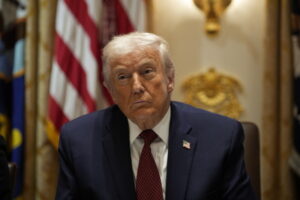Hello, today I want to focus on two books from which I managed to read excerpts and found quite interesting. The first is the memoir of Merkel, including everything she says about us—Greece. During her tenure, we went back and forth—figuratively and literally—within and outside of Europe, and endured the hardships of the bailout programs. I read the Greek excerpts with great attention. While I can’t say I learned anything new or unexpected, her descriptions of her feelings, particularly through her references to the three central figures of the drama—George Papandreou, Antonis Samaras, and of course, the main protagonist, Alexis Tsipras—are noteworthy.
Regarding George Papandreou, the legendary Chancellor reveals what we all knew: poor GAP was clueless, had no idea what was happening, or where the blows were coming from. She mentions that he kept asking for more time until the infamous bailout was announced, with the backdrop of Kastellorizo. Just imagine the mindset: having to announce a bailout with unprecedented repercussions for your people, and deciding to jazz up the scene by heading to Kastellorizo!
For Samaras, Merkel had less to say, but still covered what we all knew and experienced. Antonis, in his first year, played dumb, stalling as if he were negotiating not with the Troika but with the mayor of Messini. He implemented nothing, and later, of course, he went heavy on austerity measures, straightening things out, but his political time had run out.
In Love with Alexis…
The juicy part is Alexis, who clearly… had Aunt Angela wrapped around his finger. She even writes about his good English in her book. She highlights his disarming smile, his desire to find solutions but not knowing how, and wraps up by saying that thanks to his bailout program, things went well, and Greece exited the crisis in 2019. Honestly, if I weren’t bothered by the leader, I’d probably say the same thing: that the dirty work got done through the measures of the third bailout, which Tsipras passed and implemented, thereby cleaning up the mess. But hey, at least Aunt Angela acknowledged it. Let’s not forget, though, that Merkel, as it turned out later, still carried some of her communist East German background, which might explain why, behind Europe’s back, she joyfully shopped for free natural gas from comrade Vladimir at Veropoulos’ discount store.
A Gripping Book
The second book is none other than the biography of a highly active Greek politician: the current Minister of Citizen Protection, Michalis Chrysochoidis. A well-written autobiography that traces his journey from his childhood in a village in Imathia to today, with key milestones such as the tragic loss of his closest associate due to a bomb meant for Chrysochoidis himself and the dismantling of the 17 November terrorist group.
Chrysochoidis covers the entire living history of terrorism post-1974. What to highlight first? I’ll stick with the story he tells of meeting the father of Peratikos, who told him, “You’re sitting here relaxed in your office—he was a minister—and I’ve lost my child,” while laying out photos of his dead son. It reminded me of Chrysochoidis, many years after this incident, showing photos of his aide-de-camp Vasilakis (or what was left of the unfortunate officer) after the explosion. He would tell his interlocutors that he’s dedicated his life to capturing all those murderers.
K.M. in Cyprus
These are days of international meetings for K.M., who is flying to Cyprus today, where he’ll meet “brother Nikos” and several Cypriot ministers. On Monday and Tuesday, he’ll be in London to meet Starmer and some other folks. Against this backdrop, the new NATO Secretary General, Dutchman Mark Rutte, visited Maximos Mansion yesterday. Known in Europe as “Trump’s Whisperer” for being one of Trump’s frequent European contacts during his first term, Rutte spent about 40 minutes with K.M. in a one-on-one meeting.
Through this conversation, Mitsotakis gained better insight into Trump’s thoughts, as the former Dutch PM had visited him in Florida on Saturday. What I’m hearing is that the Americans are seeking a quick disengagement from Ukraine, though the method and negotiation formula remain unclear. During the subsequent lunch—attended by the government’s new diplomatic advisor, Milton Nikolaidis, Alexandra Papadopoulou, Aristotelia Peloni, and Thanos Dokos—K.M. spoke extensively about the European missile defense shield project, for which Greece has submitted a technical non-paper to the EU.
Samaras
In other news, Samaras has returned from the U.S. and is preparing for his upcoming appearances. Despite some speculation, he won’t be attending today’s presentation of journalist Michalis Psilos’ book on Erdogan—unlike Kostas Karamanlis. Instead, he’ll speak about foreign policy at a conference organized by the Delphi Forum on 50 years of Greek foreign policy, on December 12th, at a central hotel in Athens, a few days before the budget debate. Interestingly, on the 13th, Mitsotakis will also speak on the same topic at the same conference, setting up an intriguing face-off.
No Agenda
I asked my source at the M.M. whether the two aides—Stelios Koutnatziς, the Secretary of the “shop” (government), and Andreas Spyropoulos, PASOK’s Secretary—who arranged the meeting between Mitsotakis and Androulakis, also set an agenda. “There’s no agenda,” my source replied. “They’ll discuss whatever a Prime Minister and an opposition leader can discuss,” adding that the budget and international developments will surely be topics. This way, Androulakis will get firsthand information before Gerapetritis briefs all party leaders on December 11.
A Lawmaker’s Drama…
Several SYRIZA MPs are currently torn about whether to stay or switch to Kasselakis’ party. Sarakiotis from Phthiotis is likely to leave, as you’ll read later about his meeting. Admiral Apostolakis, returning from Canada, also seems poised to set sail for Kasselakis’ party. The most intriguing case of despair involves Argolis MP Giorgos Gavrilis, whom SYRIZA appointed as budget rapporteur. Gavrilis represents a three-seat constituency where the first three parties each win a seat. However, with SYRIZA now struggling to hold third place, while Kasselakis’ party remains an unknown quantity, the poor provincial MP sees no clear path to re-election and wonders where to go next.
Back and Forth (?)
Sokratis Famellos’ tenure as SYRIZA leader begins with an expected but notable departure. In a meeting at his office, Fthiotis MP Giannis Sarakiotis informed Famellos of his irrevocable decision to go independent. This move reduces SYRIZA’s parliamentary group to 28 members, further widening the gap with PASOK’s 31. However, don’t get too confident yet—politics can be unpredictable. It wouldn’t be surprising if SYRIZA regains its status as the main opposition party soon. How? By reclaiming MPs from the “New Left.” Word is that Rodopi’s Muslim MP, Ferhat Ozgür, is already open to dialogue with Famellos’ SYRIZA.
The GEK TERNA Hour
Now, let’s turn to market news, starting with GEK TERNA’s deal to sell TERNA Energy to Masdar. Such major business agreements don’t happen every day. Barring any surprises, the deal for transferring 67% of TENENERG is expected to close tomorrow, Thursday. This explains why GEK TERNA’s stock has been celebrating, marking five consecutive gains and closing yesterday at €18.36 (+0.88%).
Feeling Lucky at Helleniq Energy
At Helleniq Energy, they seem justified in their decision to engage in hydrocarbon exploration, especially alongside an American giant like ExxonMobil. With Donald Trump back at the helm of the U.S. and drilling regaining popularity under his “drill baby drill” slogan, the trend is gaining momentum in Greece too. ExxonMobil leads a consortium with Helleniq Energy to explore offshore blocks southwest and west of Crete, with CEO Andreas Siamisiis hinting at decisions on the next steps for exploratory drilling by the first quarter of 2025.
The Elpedison Saga: What’s Next?
But Helleniq Energy’s activity doesn’t stop with drilling decisions. The group is navigating a busy period, with several pressing issues. The fate of Elpedison, the power and gas supply company, is expected to be decided imminently—by December at the latest. Two suitors are in play: Helleniq Energy and the Italian company Edison. In a recent conference call with analysts, management projected that the Elpedison matter would be resolved by year’s end. Next, the company will focus on its 35% stake in DEPA Commercial, with plans likely to sell this share to the Greek state, which would then fully own the firm. Once that chapter closes, the next phase involves the sale of additional shares currently held by the state and the Latsis family, a move also planned for the coming year.
€600 Fines for Users of Pirated Subscription TV
Hefty penalties for end users are included in a draft law aimed at combating piracy in subscription television. According to sources, fines will start at €600 for anyone caught using pirated services and can rise significantly. This issue was among the topics discussed at a recent meeting between OTE’s new CEO, Kostas Nebis, and journalists. It was noted that tackling piracy is a key factor in growing the subscription TV market, which currently reaches 30% of households in Greece, aiming for the European average of 50%. The draft law, long-awaited by both COSMOTE and NOVA, will introduce provisions holding users of pirated content accountable. Identification of offenders will rely on multiple methods, including matching electronic addresses (IP) with customer data from caught pirates. Fines will be imposed via the tax office.
OTE to Buy Services from PPC and Faces Pressure from Elon Musk
During his meeting with journalists, OTE’s new CEO couldn’t avoid discussing competition. After the usual line—”our industry has always been highly competitive; it’s nothing new,” Nebis remarked—it became clear that OTE has no further plans with NOVA beyond their existing agreement to exchange sports channels. The situation with PPC was more intriguing. OTE is participating in a pilot program to utilize PPC’s telecom infrastructure but sees no room for broader collaboration. “We work with all providers creating fiber optic networks where needed for our customers. PPC is currently laying fiber in areas where our network is already present. However, we’re open to buying wholesale from PPC in areas not covered by our plans, and we’re piloting this,” Nebis added.
The conversation turned especially interesting when asked about SpaceX’s Starlink, which offers satellite internet in Greece at competitive prices. Nebis acknowledged Starlink’s role in filling gaps where copper cannot deliver high speeds, posing real competition to OTE’s fiber network. However, he claimed OTE has a better solution in areas without fiber coverage: Fixed Wireless Access (FWA), a product delivering ultra-high speeds. This service will be launched soon.
The Quartet of Power Players Eyeing Lavrio Port
Peristeris, Prokopiou, Holterman-Vardinogiannis, and Iliopoulos have set a December date to bid for the majority stake (50% plus one share) in the Lavrio Port Authority. An Israeli company and construction firm INTRAKAT are also in the mix, likely targeting the mandatory infrastructure and transport projects that will follow once a new owner is selected. The presence of heavyweights such as GEK TERNA, Olympic Marine (Prokopiou)-MSC Cruises, Jet Plan Shipping (SeaJets group)-AKTOR Concessions, and GPH Cruise Port Finance-Promarine, along with Israel Shipyards and INTRAKAT, could drive the bidding price high. Initial announcements are expected in December for the first phase of the tender, while final financial offers will be submitted in January during the second and final phase.
The Swiss Investor Betting €45 Million in Kozani
The much-anticipated €1.5 billion investment by the P. Germanos Group to build a lithium battery plant, which would have created 2,000 jobs in the region, seems to be falling through. Despite generous EU funding, this project no longer appears to be a priority for the Olympia Group. While not comparable in scale, Intracom Telecom, owned by a powerful Swiss investor via Intracom Middle East FZE, based in Dubai, sees upcoming friendshoring trends prompting major telecom groups to invest in Europe, including Greece.
Demand for critical “made in EU” network infrastructure is expected to rise, leading Intracom Telecom to invest €45 million in Kozani to establish a facility for manufacturing technology systems and fixed wireless solutions. With Europe seeking to reduce reliance on non-European technologies, Intracom Telecom is leveraging government incentives for decarbonization to create 150 jobs in Western Macedonia.
Rise Amidst Sleepy Trading
Over the past five years, statistics show that November has been a positive month for the General Index four times, and December five times. So far, November 2024 is shaping up to be another positive month (+1.9%), with a year-to-date return of +9%. This would make for a compelling narrative, especially with the General Index marking its fifth consecutive gain, were it not for the striking and somewhat worrying drop in trading activity on the Athens Stock Exchange. The General Index closed the session at 1,408 points (+0.13%) with a mere €65 million in transactions, €3.67 million of which came from block trades involving TITAN, OLP, and GEK TERNA.
For TITAN, yesterday marked a historic day as its market capitalization surpassed €3 billion. National Bank of Greece also helped the General Index recover, exhibiting a self-preservation reflex. After recording losses of -9.3% over the past nine sessions, it rebounded yesterday with a +1.57% rise, closing just below €7. Meanwhile, ELLAKTOR continues to celebrate its “freedom” after exiting the MSCI Small Cap index, gaining +3.21% to reach €1.73 (+2.94% the previous day). However, these developments are likely to fade quickly, as low trading volumes will force investors to search for new price levels where buyers and sellers can meet.
Red Bull Finds Its Wings in Poland
Last September, Andreas Symeonoglou stepped down as General Manager of Red Bull Hellas, signaling a strategic shift as Red Bull Hellas’ plans would now be drafted and executed by its parent company. Yesterday, it was announced that Thanos Athanasopoulos, who previously served as Managing Director for Barilla in Poland, will take over as Red Bull Hellas’ new General Manager.
Under its new leadership, Red Bull is tasked with independently distributing its products in Greece’s challenging market, characterized by significant geographical complexities.
The American Homer and the Germans Who (Now) Want More Debt
The bond market on both sides of the Atlantic appears to be moving as if dazed. In Germany, once a bastion of fiscal conservatism, political parties are openly discussing the need to increase public debt (currently at 67% of GDP) to address pressing social and defense expenditures. This means more bond issuances, which in turn are triggering massive sell-offs, pushing the yield on Germany’s 10-year government bond higher. For the first time, the 10-year bond yield surpasses the interest rate on euro-denominated interest rate swaps.
Across the Atlantic, the strong-dollar policy necessitates high interest rates. Yet, Trump appointed a “hedge fund Homer” as Secretary of the Treasury. Scott Kenneth Homer Bessent, a 62-year-old veteran of the hedge fund world, will face pressure from hundreds of hedge funds with massive leveraged exposure ($600 trillion) to interest rate futures.
Bessent, whose first name is a nod to the ancient Greek poet, has a long history with prominent funds like Brown Brothers Harriman, Kynikos Associates (founded by Jim Chanos), and Soros Fund Management. In 2015, he co-founded Key Square Group with Michael Germino, employing both mathematical and complex geopolitical models for macro market analysis. This comes in an economy now paying $1 trillion annually just to service its public debt interest.
Ask me anything
Explore related questions





